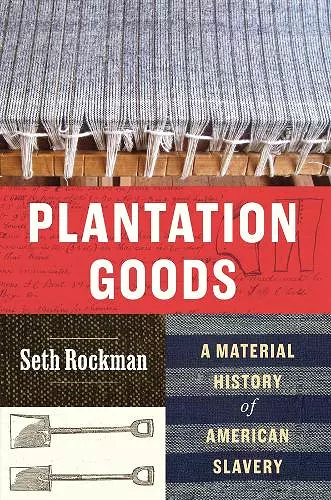Plantation Goods
A Material History of American Slavery
Format:Hardback
Publisher:The University of Chicago Press
Published:11th Feb '25
Should be back in stock very soon

This book reexamines American history by revealing the economic ties between the Northern industrial economy and Southern slavery, as seen in Plantation Goods.
In Plantation Goods, historian Seth Rockman challenges the conventional understanding of nineteenth-century American history by highlighting the intricate connections between the Northern industrial economy and Southern slave labor. Traditionally, we have viewed the North and South as distinct entities, focusing on their differences rather than their interdependence. This perspective, however, obscures the economic relationships that existed prior to the Civil War and the pervasive influence of slavery in various regions, including small New England communities. Rockman emphasizes the significance of everyday objects, such as plantation goods produced in the North, in revealing the broader narratives of American history.
Through a compelling examination of material culture, Plantation Goods uncovers the ways in which Northern manufacturing supported the Southern slave economy. By tracing the journeys of items like shoes and tools created in the North and used by enslaved individuals in the South, Rockman illustrates a national economy intricately organized around slavery. The book intertwines the stories of Northern industrialists, Southern slaveholders, and enslaved workers, demonstrating how their lives were interconnected in a complex web of economic activity.
Rockman’s work not only sheds light on the economic and moral implications of slavery but also explores the broader societal impacts of these relationships. By bringing together disparate lines of American history, Plantation Goods reveals how the seemingly mundane aspects of life, such as the production of clothing and tools, were deeply entwined with the institution of slavery and the development of capitalism in the United States.
“Rather than casting the antebellum US as a region of slave interests and a region of freedom, this narrative is focused on the material interests that united them. Ideologically they opposed each other, but the project of national economic unification based on regional specialisms was a success. Together, the regions accepted that slavery provided them with a way to climb out of Britain’s shadow until they were strong enough to argue that they were now enslaved to each other.” * Times Literary Supplement *
"Beautifully written, incredibly researched, and shows us a single, entwined economy north and south—through the lives and work of men and women in New England who produced goods like shoes and clothing and tools for people enslaved on southern plantations, and the people who were their enforced consumers. It will make you think differently about how objects take on and then promote meanings, including multifaceted racism." * Scholarly Kitchen, Best Books of 2024 *
"Seth Rockman is one of the most creative and original American historians writing today, as Plantation Goods richly demonstrates. He casts a brilliant new light on the deeply studied subjects of slavery and capitalism." -- Marcus Rediker, author of The Slave Ship
"By pursuing a method of 'follow the things,' adopting an innovative narrative structure, and analyzing a rich collection of archival and material evidence, Seth Rockman deftly unpacks the culture and commerce of plantation goods that perniciously shaped racial 'knowledge' while making fortunes and channeling labor. This stunning study overflows with penetrating yet sensitive insights, capturing the nuanced experiences and interlocking relationships that formed a tainted yet consequential trans-regional enterprise."
-- Tiya Miles, author of All That She Carried: the Journey of Ashley’s Sack, a Black Family Keepsake
"Rockman has given us a brilliant book that shows how slavery permeated the American landscape. Clearly written and deeply researched, Plantation Goods is a much-needed contribution to the study of the institution that helped define early America and, therefore, helped make us who we are today."
-- Annette Gordon-Reed, author of The Hemingses of Monticello: An American Family
"Plantation Goods is the most satisfying history of commodities and one of the most multidimensional histories of slavery I have ever read, embracing as it does consumers, workers, and manufacturers. Critics of the 'slavery's capitalism' framework have sometimes asked, what about the northern economy? Here is the answer, and so much more. Bold yet careful, precise, and thoughtful, Rockman shucks off overreach and sensationalism to deliver the goods."
-- David Waldstreicher, author of Slavery's Constitution and The Odyssey of Phillis Wheatley
"In this remarkable book, Seth Rockman shows how close attention to the circulation of material goods related to slavery—agricultural implements, clothing supplied to slaves by their owners, whips, and the like—sheds new light on the complex economic connections between northern manufacturers and southern purchasers. Rockman reminds us of the central role played by slavery in the evolution of American capitalism, and how the hope of liberating slaves' purchasing power contributed to abolition."
-- Eric Foner, author of The Fiery Trial: Abraham Lincoln and American Slavery
ISBN: 9780226723457
Dimensions: 229mm x 152mm x 38mm
Weight: 794g
496 pages